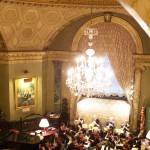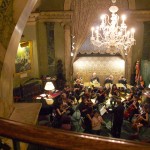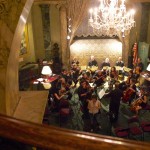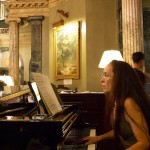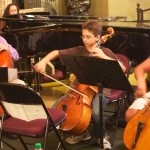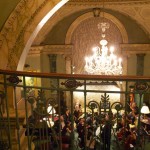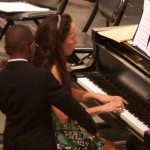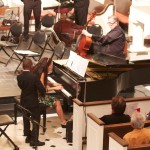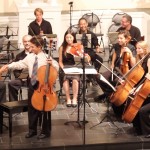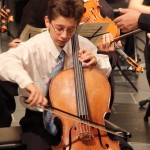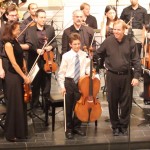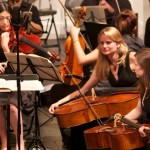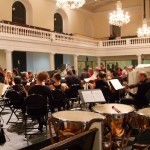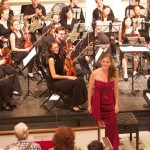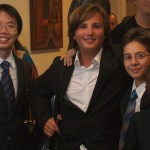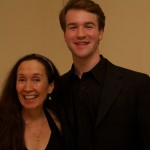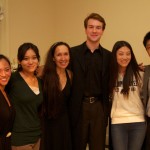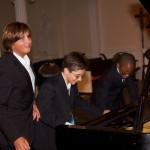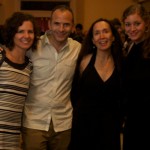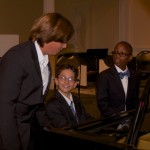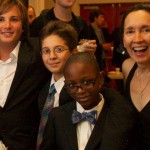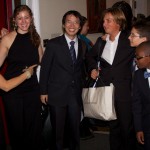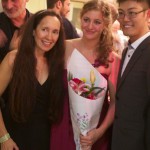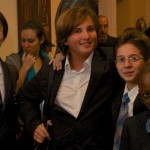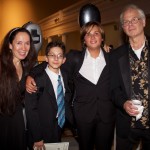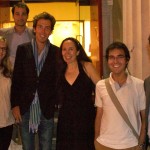| Below a Review of our September 2012 concerts that appeared in The Epoch Times.Click the pictures on the right to see a larger version and a slide show.
Church Concert Commemorates 11th Anniversary of 9/11 Julie Jordan Presents features prizewinning soloists By Michael SherwinOn the night of Sept. 11, Julie Jordan Presents sponsored a concert commemorating the 11th anniversary of that epic tragedy. The concert was held in the Church of St. Joseph in Greenwich Village, serving the downtown community north of the World Trade Center site.On hand for the proceedings was an assortment of gifted soloists, supported by Julie Jordan’s New York Concerti Sinfonietta, a superb 38-piece professional orchestra sensitively led by principal conductor Paul Hostetter. The orchestra’s personnel included such luminaries as Adele Pena, concertmistress of the Orpheus Chamber Orchestra, and Julia Bruskin, cellist of the acclaimed Claremont Trio. Dr. Jordan, the concert presenter, is a member of The Juilliard School Evening Division faculty. The first two works of the evening were designed to offer a message of consolation. The program opened with David Popper’s “Requiem” for three cellos and piano, Op. 66. Popper, a Czech cellist and composer, was roughly contemporaneous with Antonin Dvorák. Next, violinist Claudius Agrippa, accompanied by Julie Jordan, mesmerized the audience with the “Meditation” from “Thaïs” by Massenet (the centennial of whose death was observed on Aug. 13). At a supplemental concert on Sept. 8 at Steinway Hall, Julie Jordan afforded Claudius the opportunity to perform the first movement of Mozart’s Fifth Violin Concerto with her orchestra, as winner of the New York Youth Debut Prize. He played from memory with an appealing directness, well-articulated bowing, and inherent musicality. Although his playing will surely exhibit greater refinement as he matures, there was no question of his potential. Also on the program of the Sept. 8 concert was an outstanding oboist, Julia DeRosa, First Prize winner of the Young Artist Debut award. The 21-year-old DeRosa studies at The Juilliard School with Elaine Douvas, principal oboe of the Metropolitan Opera. DeRosa performed Mozart’s Oboe Concerto in C Major, K. 314. At the Sept. 11 concert, Marco Biaggio, one of the cellists in the Popper, was also heard in the Boccherini Cello Concerto in B Flat Major. Marco, a Grand Prize Debut winner, is entering the seventh grade. He studies with André Emelianoff at The Juilliard School’s Pre-College Division. Marco played the Friedrich Grützmacher arrangement of the concerto, a romanticized recomposition of the work made in 1895, 125 years after it was written, which is now being gradually displaced by Boccherini’s original. Nonetheless, it was comforting to re-encounter the once ubiquitous traditional transcription—however anachronistic. Marco’s highly disciplined playing conveyed a maturity considerably beyond his years. His command of bowing and fingering was precocious. He produced a full-bodied tone, varied the speed and amount of vibrato, was willing to play really quietly when warranted, and savored slower passages for their full expressive potential. His intonation was remarkably secure in rapid scales and arpeggios, even in the highest reaches of the fingerboard. If pitch was not always equally reliable elsewhere, this was of small consequence, considering the totality of his accomplishments. Maestro Hostetter led a sympathetic, well-balanced accompaniment. Next, Sara Sherman performed Schumann’s Piano Concerto in A Minor, Op. 54. Sherman, who was awarded First Prize in the “Shining Stars Debut Series,” has earned advanced degrees from the Manhattan School of Music. She delivered a deeply satisfying, fresh, and insightful performance of this repertory staple. In the hushed interludes, her highly inflected playing incorporated a wide variety of touch; her accenting of inner voices evidencing both poetry and imagination. Prokofiev’s Piano Concerto No. 3, Op. 26, came as the conclusion of an already long program. It proved worth the wait. The Grand Prize winner of the New York Concerti Sinfonietta International Piano Concerto Competition, Ta-Wei Yu, a native of Taiwan, delivered an electrifying performance of staggering virtuosity, without slighting Prokofiev’s lyricism or his playful whimsy. A graduate of the Manhattan School of Music, Yu is presently a doctoral candidate in musical arts at Rutgers University. The finale concluded in a coruscating blaze of perfectly controlled, blindingly fast octaves that appreciably outstripped nearly every well-known pianist who has recorded the work. Maestro Hostetter and the orchestra partnered him with full-throated abandon. If the first part of the concert looked back to provide consolation for what had been lost on 9/11, the remainder of the concert looked forward. It demonstrated the power of inspired music-making as an affirmation of life, sustained by the promise of youth, serving as a beacon of hope for the future. Michael Sherwin has held Rockefeller and Fromm Foundation Fellowships in music criticism. |
|

